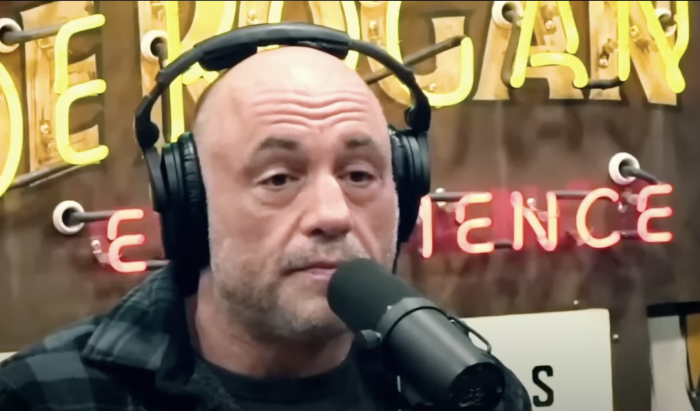By Dustin Rowles | Celebrity | September 17, 2025

For the unfamiliar, Elephant Graveyard is a mysterious, anonymous creator best known for long-form pop-culture video essays on YouTube. Their most notable work dissects the rise of Joe Rogan, with a particular focus on the Austin comedy scene. Over the last year, they’ve picked apart Joe Rogan’s career, culminating in last month’s hour-and-a-half essay, How Comedy Was Destroyed by an Anti-Reality Doomsday Cult.
At ninety minutes, the essay is longer than most viewers will tolerate, especially if they’re indifferent to Rogan or Austin comedy. Still, the video — amplified repeatedly by Marc Maron and others — has landed with force. It’s fascinating, sharp, satirical, conspiratorial, and, yes, probably 45 minutes too long.
What makes it resonate isn’t just the portrait of Rogan, however, but the broader parallels Elephant Graveyard draws. The video compares Rogan’s rise to Elon Musk’s reality distortion project: Musk, dissatisfied with the world he inhabited, attempted to bend reality around himself, investing enormous resources in manufacturing an alternate version where he is adored. Rogan, the essay argues, did something similar in Austin. He built a self-contained “simulacrum”: a comedy cult less about humor and satire than loyalty, conformity, and veneration of its leader — Joe Rogan, “Comedy Czar.”
Elephant Graveyard catalogs in detail how comedians and “intellectuals” have willingly surrendered credibility for Rogan’s blessing, something they refer to as “philosophical suicide” or “sui,” a concept borrowed from Albert Camus. They appear on his podcast, spend hours praising his genius, anoint the Mothership as comedy’s new capital, and then recycle anti-woke talking points on stage to affirm their allegiance. It looks a lot like a Donald Trump cabinet meeting.
The picture isn’t flattering. Tony Hinchcliffe emerges as the JD Vance to Rogan’s Trump: a sycophantic enabler who embodies the shift from traditional comedy toward a hyperreal, polarized model where shock, tribal loyalty, and anti-reality posturing dominate. That this new right-wing comedy hub has taken root in Austin — long celebrated as Texas’s liberal haven (“Keep Austin weird!”) — makes the phenomenon even stranger and more discordant.
What’s most revealing is how Rogan and his circle frame themselves as anti-establishment rebels crushed by “woke” orthodoxy, even as they cash huge corporate checks. Rogan hosts the most popular podcast in America and earns hundreds of millions of dollars. Hinchcliffe has a lucrative Netflix deal. Their world runs on Spotify, Apple, and Netflix, the establishment itself. Comedy punches upward, but they’ve become the establishment. Instead of pushing back against political power, they’re helping to write the script. There is nothing anti-establishment about them. They got the President elected. They’re not tearing down comedy institutions; they are the institution.
That contradiction may be beginning to fracture their empire. Increasingly, comics are distancing themselves from the Austin orbit. Bobby Lee, Stavros Halkias, Andrew Santino, and others have not only rejected the association but openly criticized it. Even Shane Gillis — long associated with Rogan’s scene — now insists he’s a Philly comic, not an Austin one.
Most comedians don’t want to be branded as lackeys to a cult leader. It damages their reputations and Rogan’s own. Elephant Graveyard’s latest essay has already racked up 2.4 million views, a staggering number for something feature-length. As those critiques spread, comedians are making a calculation: it’s safer to be seen as independent than as Rogan’s loyal subject. Even Rogan, in a moment of laughably unconvincing self-defense, recently insisted he’s “not an anti-woke comedian.” Bruh. Anti-woke gatekeeping is the price of admission to his cult.